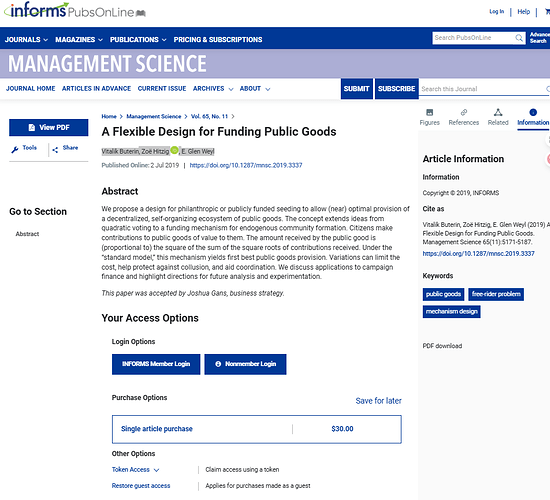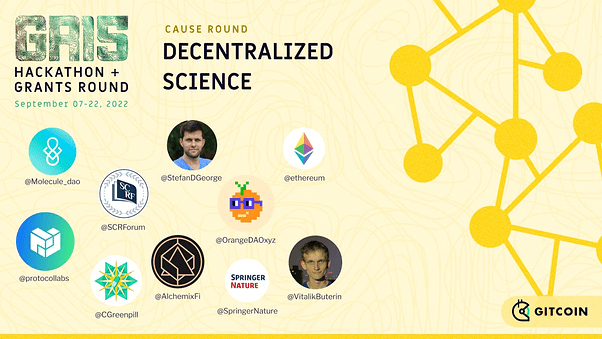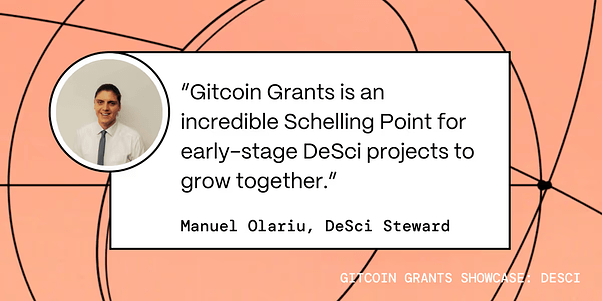The Problem & Importance of Decentralized Science (DeSci)
Science is built upon cumulative knowledge, peer review, and the free exchange of ideas. Yet, the traditional academic ecosystem imposes significant structural constraints on these foundations. Peer-reviewed publications, while critical to validating discoveries, often require authors to transfer copyright to publishers, limiting access to knowledge and the broader dissemination of research. For instance, the seminal work on Quadratic Funding by Vitalik Buterin, Zoë Hitzig, and E. Glen Weyl, published in Management Science (Copyright © 2019, INFORMS), exemplifies this tension. While the preprint is freely accessible, the formal version is behind a paywall and the peer reviewers—whose expertise ensures the work’s rigor—receive no financial compensation, offering their labor purely as a professional obligation.
A Flexible Design for Funding Public Goods - Preprint edition on Gitcoin Website
A Flexible Design for Funding Public Goods - Postprint edition (official) on Informs. Single article purchase $30.00, owned by INFORMS
https://pubsonline.informs.org/doi/epdf/10.1287/mnsc.2019.3337
For-profit academic journals have been found to charge up to four-times the amount of non-profit publishers. Submission fee ranges from $150-$5,000 USD, and subscription fees quickly add up. In 2012, Harvard University paid over $16,000,000 to academic publishers. Typically, these publishers operate at 30%+ profit margin. The largest of which, Elsevier, is responsible for publishing over 24% of scientific papers and collects over $3,000,000,000 in revenue every year.
from The business model of for-profit academic publishers, ResearchHub (Ref)
These systemic limitations are part of the larger problem DeSci seeks to address. By enabling research outputs, funding mechanisms, and peer review to be open, transparent, and community-governed, DeSci restores academic freedom and broadens access to scientific knowledge. It transforms essential but invisible contributions—like reviewing, iterating on complex proofs, or designing funding formulas—into acknowledged public goods.
Without decentralized, open frameworks, the fruits of scientific labor remain constrained by copyright, publisher mandates, or short-term funding pressures. DeSci ensures that innovations—whether in cryptography, peer-to-peer economics, quadratic funding, or emerging scientific methods—can be shared, validated, and built upon, independent of institutional gatekeepers.
While DeSci may not produce breakthroughs like penicillin or the optical fiber network in 6 months, it will cultivate the infrastructure for long-term scientific freedom and innovation, e.g. cryptography. Just as water and oxygen are essential yet invisible, DeSci will underpin the scientific ecosystem quietly but indispensably. By supporting DeSci today, platforms like Gitcoin and Ethereum public goods funding are planting the seeds that, decades later, will sustain a truly open and collaborative global research community.
Gitcoin’s Unique Role & Fundraising
All in all, there have been five Gitcoin Grant DeSci community rounds since Q4 2022.
| Time | Round | Matching pool | Number of Projects | Number of Donors |
|---|---|---|---|---|
| Sep 2022 | GR 15 and team initiated and led by Boris Dyakov | 567k | 82 | 2309 |
| May 2023 | Beta Round and team - led by Boris Dyakv and Manuel Olariu | 75k | 65 | 267 |
| Apr 2024 | GG20 and team - led by Manuel Olariu | 25K | 29 | 292 |
| Aug 2024 | GG21 and team - led by Swift Evo | 39K | 49 | 390 |
| Mar 2025 | GG23 and team - led by Swift Evo | 5K | 21 | 80 |
| Sum | 711K | 249 | 3338 |
Endorsements
1st DeSci Round of 2022 under Ethereum Foundation, Vitalik and other strong supporter endorsement.
The essence of a successful round extends beyond allocation of funds; it lies in the invaluable exposure to a like-minded community and the opportunities for networking and collaboration it presents. The DeSci round exemplifies this ethos, serving as a catalyst for forging long-term, collaborative connections in the DeSci ecosystem.
from Enabling DeSci: Gitcoin’s Role in Transforming Scientific Funding, 2024
Ref:Enabling DeSci: Gitcoin's Role in Transforming Scientific Funding | Gitcoin Blog
Success Measurement & Reflection
What specific outcomes will show success within 6 months?
Within six months, participating regional DeSci communities will have nominated suitable grassroots projects to join the round. This nomination process will reflect the decentralized nature of the initiative—discussions and decision-making will take place independently within each region, guided by local priorities, cultural contexts, and ecosystem needs.
Each regional partner will identify and elevate projects that demonstrate both local relevance and alignment with DeSci principles, ensuring a diverse portfolio across geographies. Following nomination, communities will take an active role in tracking and assessing project outcomes. This will shift the post-round engagement model from passive data collection to proactive impact verification—regional communities will engage directly with grantees, conduct follow-up interviews, and gather qualitative insights to complement quantitative reporting.
By the six-month mark, we expect to see:
-
A complete set of regional nominations (5–8 projects per partner).
-
Cross-region visibility of grassroots DeSci initiatives through shared documentation and storytelling.
-
Community-led impact tracking where regional partners actively report progress and learnings from their nominated projects.
How will we measure genuine impact beyond just activity metrics?
We will adopt a layered measurement framework:
-
Tier 1 – Round Operator: Oversees the process design, ensures alignment with Ethereum public goods principles, and maintains transparency in reporting.
-
Tier 2 – Geographical Communities: Act as both nominators and local verifiers, applying contextual understanding to assess the relevance and effectiveness of projects.
-
Tier 3 – Grassroots Projects: Deliver on their proposed outcomes, engage with their communities, and integrate feedback loops for continuous improvement.
Impact measurement will extend beyond raw activity counts by emphasizing ecosystem connectivity and collaborative potential. For example, a project in DeSci India could establish a working relationship with Greenpill India or Celo India, creating cross-ecosystem synergies that outlast the funding cycle.
Sustainability will be embedded into the funding model through regular DeSci rounds, enabling a steady flow of resources to grassroots initiatives. As projects mature, their integration into the broader network—via Gitcoin rounds, regional collaborations, and thematic partnerships—will serve as a strong indicator of enduring impact.
Success will be defined not just by the immediate outputs of individual grantees, but by the strength and resilience of the interconnected DeSci ecosystem they form.
Fundraising Check
To ensure the long-term viability of the DeSci Localism Round, we will actively seek external co-funding and strategic support from aligned networks, including Ethereum Localism, Allo Capital, the Greenpill Network, Celo, Glo Dollar, and other established DeSci communities. These partners share our commitment to decentralized, community-driven funding for public goods, making them natural collaborators in amplifying the impact of grassroots science initiatives.
Our team brings a proven fundraising track record. Since 2022, we have successfully hosted five DeSci community rounds, mobilizing resources across diverse ecosystems and distributing them transparently to projects with measurable impact. This history demonstrates not only our operational capacity but also the trust we have earned within the global DeSci and Ethereum public goods community.
By combining our established fundraising infrastructure with these strategic partnerships, we aim to:
-
Leverage matching contributions to increase total funds available for distribution.
-
Diversify funding sources to reduce reliance on a single platform or donor base.
-
Build recurring revenue streams through sustained engagement with aligned public goods funding events and networks.
This multi-pronged fundraising approach will allow us to maintain a steady flow of resources into grassroots DeSci projects, reinforcing the network’s resilience and capacity for long-term growth.
Domain information - DeSci
1. Round Objective
To fund and grow grassroots DeSci projects through regional community partnerships, embodying Ethereum Localism and ensuring that funding reaches initiatives with proven local impact.
2. Key Principles
-
Local Knowledge First – Regional DeSci communities know their ecosystem’s needs best.
-
Cross-Ecosystem Collaboration – Engage with Ethereum-aligned networks like Greenpill and ReFi DAO for external review and cross-pollination.
-
Sustainability – Maintain a capped pool with roll-over for long-term funding continuity.
Transparency – Clear nomination, review, and reporting processes to ensure fairness and accountability.
3. Participation Structure
-
Regional Partners:
-
Target 5–7 regional DeSci communities (e.g., Latam, Asia, Africa, DesciWorld, DeSc nodes in Euro).
-
Each partner nominates 5–8 projects from their local ecosystem.
-
-
Total Expected Projects: 25–50.
4. Nomination Process
-
Regional communities select nominees based on local relevance, impact potential, and alignment with DeSci principles.
- DeSci LATAM
- DeSci Asia
- DeSci Africa
- DeSci World
- etc
-
Nominees must be connected to the regional DeSci network and demonstrate prior or potential contributions to public goods.
5. Review Process
-
Local Review: 1 independent reviewer from the same region, with a proven track record in local DeSci development.
-
External Review: Cross-region reviewer or partner from Greenpill / ReFi DAO.
-
All reviewers sign conflict-of-interest declarations before assessment.
6. Distribution
- Grants allocated via Quadratic Funding and COCM (if Gitcoin platform available or make it on Garden) or an alternative open-source matching system.
- We will also consider distributing part of funding through retroPGF according to grass root projects past achievement.
- A certain amount in the funding will be reserved for the working team and the regional community to ensure their contribution is recognized.
- Equal opportunity for all nominees, the working team will determine the final decision.
7. Post-Round Impact Tracking
-
Regional partners collect quarterly updates from their nominated projects.
-
Updates feed into an after round Impact Report for transparency and learning.
-
Projects with strong follow-up may get priority in future rounds.
9. Benefits for Regional Partners
-
Funding support for impactful local projects.
-
Recognition as a DeSci Round Ops Partner in reports, website, and social media.
-
Direct link to Ethereum public goods narrative and global DeSci ecosystem.
-
Opportunities for co-funding and cross-ecosystem collaborations.
10. Tentative Timeline
| Phase | Dates (TBD) |
|---|---|
| Partner Onboarding | Week 1–3 |
| Nomination Period | Week 3–6 |
| Review & Selection | Week 6–7 |
| Public Round | Week 7–9 |
| Funding Distribution | Week 10-14 |
| Impact Following | Quarterly for 1 year |
DeSci Round Ops Team
Swift Evo, co-founder of DeSci Asia
maria.freitas, founder of DeSci Reviews
Scott Itepu, borderlescience
Brenda, founder of DeSci LATAM
Anshuman, working group member, DeSci Asia
Twitter
https://x.com/desci_round_ops
Telegram


